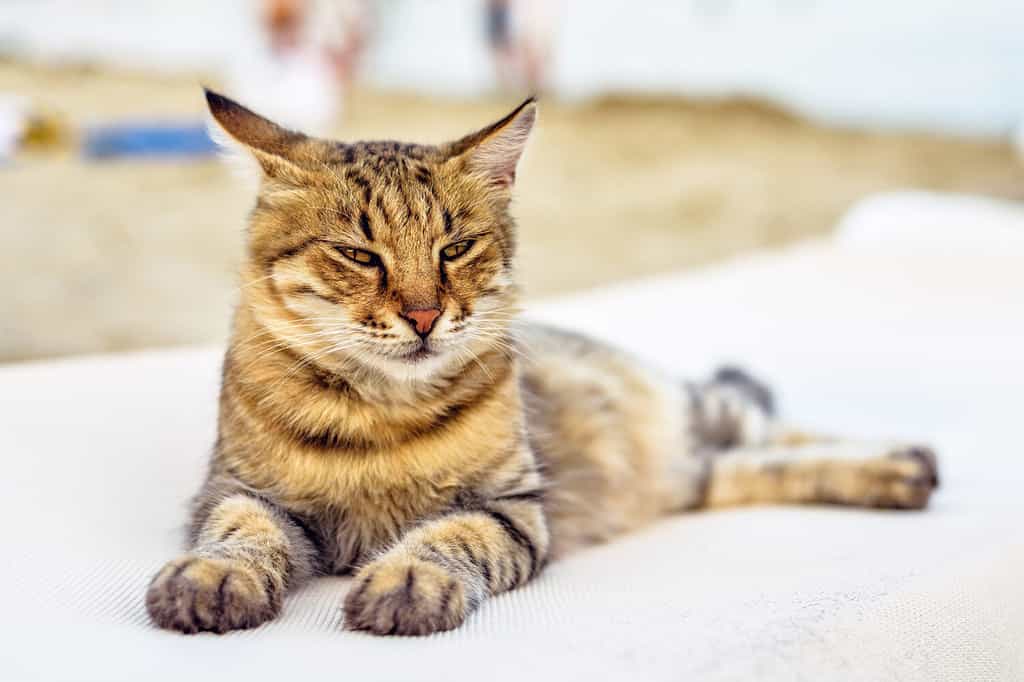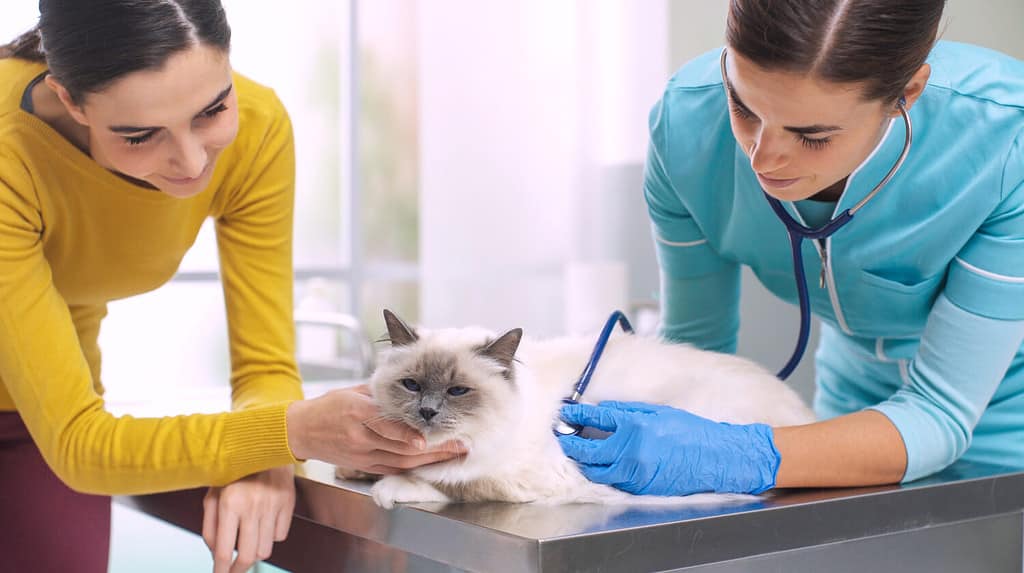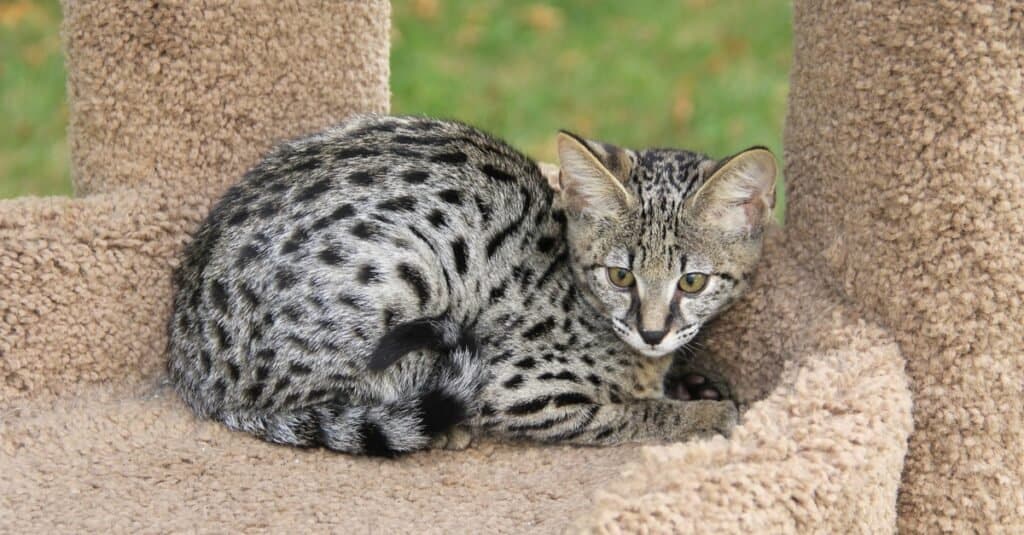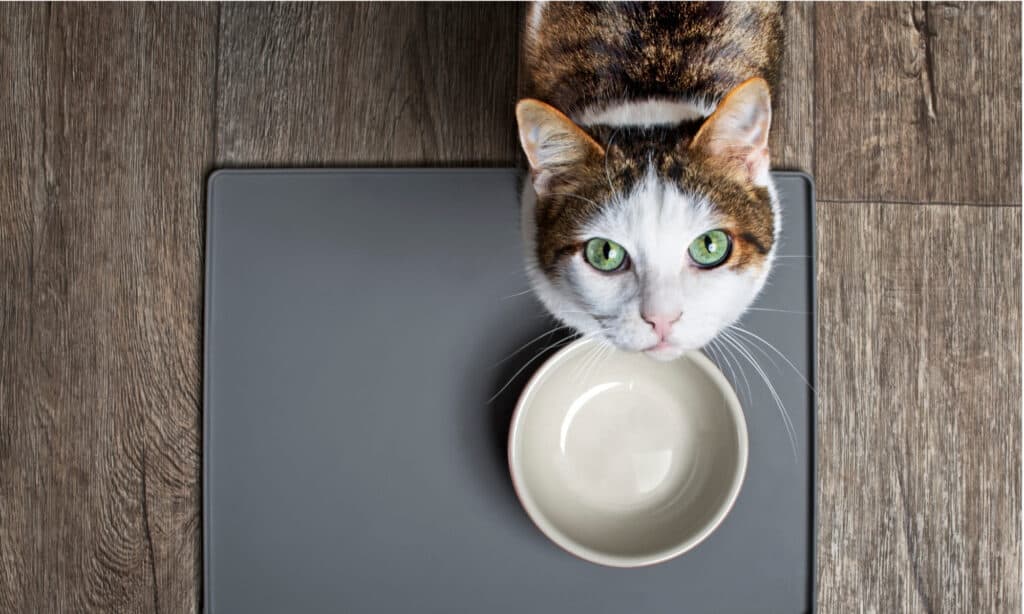Have you ever been sitting on the couch at home eating a banana and felt the tap of a tiny paw on your arm? Or perhaps you felt your cat’s inquisitive stare petitioning you for a piece of your snack. Our pets love our food and we love to share it with them, but not everything is healthy for them to eat. This begs the question: can cats eat bananas? Read on for the four things you should know before feeding your cat this sweet treat.
Can Cats Eat Bananas?
According to the ASPCA, cats can safely eat bananas in small quantities. Bananas are not toxic for cats, though they are not necessarily the healthiest option due to their high caloric content and limited protein. If your cat likes bananas, the best option is to give them small pieces at a time while limiting their access to other forms of treats. As always, it’s best to check with your vet before giving your cat a new type of food. Obese or diabetic cats should not have bananas as the sugar and starch can exacerbate their health issues.

Cats can safely eat bananas in small quantities.
©FrimuFilms/Shutterstock.com
4 Things to Know Before Feeding Your Cat Bananas
Before feeding your cat bananas, there are a few things you should know about its effects and how much to give.
1. Banana Peel Isn’t Good for Cats
Although banana peel isn’t toxic for cats, it’s highly indigestible. It also presents a potential choking hazard. For both reasons, it’s best not to let cats have any part of the peel, even to play with. Stick to the fruit itself, which is digestible and easily chewable in small portions.
2. There Are Both Benefits and Drawbacks to Feeding Your Cat Bananas
As with many foods, there are both benefits and drawbacks to adding bananas to your cat’s diet.
Benefits of Feeding Your Cat Bananas
The benefits of eating bananas for cats include the following:
- A good source of fiber. Bananas are high in soluble fiber, which can help regulate bowel movements and provide other health benefits.
- A good source of potassium, vitamin C, and vitamin B6. Certain vitamins and minerals in bananas can benefit your cat.
- A source of glucose. Glucose converts into energy, which fuels your cat’s daily activities.
- A change of pace. If your cat likes bananas, the taste and texture will give them a break from their usual dry or canned food.
Drawbacks of Feeding Your Cat Bananas

Too much banana can cause gastrointestinal issues in some cats.
©Stock-Asso/Shutterstock.com
The drawbacks of eating bananas for cats include the following:
- Very calorie-rich. Because bananas are calorie-dense, they don’t make the best snack for cats. This is especially true for cats that tend to gain weight easily, live a sedentary life, or have underlying health issues like diabetes. As with any high-calorie treat, bananas are best given in moderation, which means infrequently and in small amounts. For this reason, they do not make an appropriate daily treat.
- Can contribute to gastrointestinal upset. New foods of any kind can upset an animal’s gastrointestinal system, and bananas are no exception. Bananas are high in both sugar and starch, which can throw off a cat’s GI system. This may result in pancreatitis, diarrhea, constipation, vomiting, and regurgitation. Test your cat’s reaction by giving them a very small piece first and observing its effects.
- Limited nutritional value. Bananas lack the kind of nutrients cats need from their food. As obligate carnivores, cats have developed to require meat in their diets. The vast majority of their caloric intake should go toward providing them with protein, vitamins, minerals, fatty acids, amino acids, and other benefits found in meat-based foods.
3. You Should Limit the Amount of Banana You Give Your Cat

Treats should make up no more than 10% of a cat’s daily caloric intake to prevent obesity.
©Lindasj22/Shutterstock.com
If your cat likes bananas and seems to react well to them, you might consider giving them a small portion as a treat. (Again, keep in mind that bananas do not have the nutrients required to sustain obligate carnivores and therefore should not be given in large quantities.)
In general, treats should make up no more than 10% of a cat’s daily caloric intake. Most cats need between 20 and 33 calories a day per healthy pound (with outdoor cats needing more than indoor cats), which amounts to 200-330 calories a day for a 10-pound cat. (This is only an estimate; make sure to check with your vet for your cat’s individual caloric requirements.) Medium-sized bananas have around 105 calories on average. For a cat that consumes 200 calories a day, that would be about one-fifth of a banana. However, that may still be too much for your cat given the amount of sugar and starch present. To be safe, some experts recommend giving your cat no more than a one-inch piece of banana at a time. If in doubt, check with your vet for the right amount.
4. Cats Don’t Necessarily Like Bananas
Bananas may not be toxic to cats, but that doesn’t mean your cat will necessarily like them. After all, cats are notoriously picky when it comes to what they put in their mouths. Chances are, your cat won’t take to bananas even if you do offer them as a treat. As obligate carnivores, felines naturally gravitate toward meat and meat-based foods. In general, fruits and vegetables hold little interest – or nutrition – for them.
What Food Should I Give My Cat?

Cats are obligate carnivores, meaning they need meat in their diet.
©iStock.com/Lightspruch
Cats are obligate carnivores, so whatever they eat should be meat-based and rich in protein. High-quality dry or canned food will provide a solid foundation for a complete diet. See this article for a list of the best cat foods across five categories, which include the best foods for seniors and kittens as well as premium and budget options. Also, check out the best lickable cat treats and best soft cat treats for your furry friend.
What Other Fruits Can Cats Eat?
Cats can safely eat the following fruits besides bananas:
See this list of foods that cats can and can’t eat, including chocolate and dog food.
Conclusion
Although cats can eat bananas, these fruits are calorie-rich and therefore not recommended as a daily snack or in large portions. They also have little to no nutritional benefit for obligate carnivores, which means your cat is consuming empty calories. In some cases, bananas can even cause gastrointestinal upset. If you decide to try feeding your cat bananas, ensure you keep the portions small and infrequent. When in doubt, consult your vet.
The photo featured at the top of this post is © iStock.com/Svetlana Popova
Thank you for reading! Have some feedback for us? Contact the AZ Animals editorial team.







